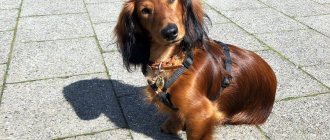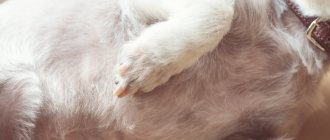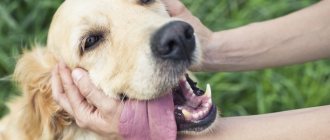Life with a snoring dog can be just as miserable as living with a snoring partner, especially when the dog is given the privilege of sharing a bedroom or even the same bed. However, it seems that when the snoring partner is a four-legged companion, dog owners are more forgiving and willing to turn a blind eye, or shall we say, deaf!
Many dog owners actually admit that they find their dog's snoring quite adorable, however, the spicy factor aside, snoring in dogs can sometimes be a sign of problems that need to be addressed. So, let's take a closer look at why dogs snore and how to recognize potential signs of trouble.
First introduction to dog snoring
Why do dogs snore? To understand dog snoring, we first need to take a little lesson in dog anatomy. When dogs sleep, they constantly pass air through their nose, soft palate, and trachea.
Generally speaking, snoring occurs when there is some kind of blockage in a dog's upper respiratory tract. As air flows unevenly past the clog, it creates a vibrating noise that we commonly call snoring.
In most cases, the noise occurs when the dog inhales air and can occur during any stage of sleep. There are several reasons why dogs snore.
Algorithm of actions for snoring in a pet
In order to get rid of an unpleasant physiological phenomenon of an animal, such as snoring, you need to perform the following list of actions:
- First of all, you need to pay attention to the comfort of the sleeping place.
- If the dog is taking any medications, they should be noted.
- If you suspect an allergic reaction, you can change your pet’s resting place, adjust its diet and replace its favorite toys.
- The process of walking the dog must be carried out in places where there is no significant air pollution with hazardous substances. This applies to both vehicle exhaust gases and gases that spread around large enterprises.
- If your pet is overweight, it is imperative to get rid of it. This can be done through diet and proper training.
It is necessary to feed your pet with high-quality food
Important! If you follow all the above rules, you can completely get rid of your dog’s snoring during sleep, or significantly reduce the severity of this physiological phenomenon.
Compliance issue
Some dogs are more prone to snoring due to their facial features. Brachycephalic dogs (dogs with a retracted muzzle) such as bulldogs, pugs, Pekingese and boxers are often pattern snorers.
While these facial structures are highly prized in the canine world for their urgency, they are also to blame for the noise they create.
The main problem is that these dogs have shortened snouts, which cause them to have trouble breathing, notes veterinarian Matthew Hoffman in Symptoms and Solutions: The Ultimate Guide to Home Health—What to Look for.
© shutterstock
These dogs' facial features are to blame: their elongated soft palate, which is sucked into the dog's airway, their narrow, slit-like nostrils, and their small trachea.
Some of these body abnormalities can be corrected surgically if they are interfering with the dog's overall ability to breathe.
Did you know? A sleep laboratory study of bulldogs found that most had some degree of sleep apnea. Sleep apnea causes them to wake up hundreds of times in one night, explains veterinarian Dr. Asaf Dagan.
Some common snoring triggers
A pet's snoring is not always a natural occurrence. It can be quite dangerous in the following cases:
| Happening | Image | Description |
| For obesity | This problem causes grunting not only during sleep, but also when walking. The joints and heart are affected by significant body weight. The dog's chest is compressed quite strongly. In addition, the larynx swells and, as a result, the animal is unable to capture a sufficient volume of air. | |
| For asthma | This serious pathology is caused by a variety of factors. Attention should be paid, first of all, to the poor environmental situation, the effects of cigarette smoke on the body, brachycephalic syndrome, allergic reactions, severe heart failure and many other problems. Asthma is characterized by suffocation, drooping of the skull, stretching of the neck, constant opening of the mouth, and constant attempts to grab more air. This problem has no cure, but can be corrected with medication. | |
| For urolithiasis | This disease leads to the fact that over time it causes blockage of the ureter. This problem ultimately provokes displacement of internal organs, as well as the occurrence of painful sensations. Urolithiasis due to long-term development leads to the occurrence of snoring during sleep or extraneous sounds during wakefulness | |
| For helminthic infestation | This applies to parasites that live not in the gastrointestinal tract, but in other organs and systems of the animal’s body. First of all, this concerns the blood, brain, heart muscle, lungs, etc. Due to the fact that worms are able to migrate, symptoms can periodically change each other, affecting either the heart or the respiratory system |
In all of the above cases, it is imperative to seek help from a veterinary clinic. It is extremely important to make a correct diagnosis, since the elimination of different pathologies is carried out in completely different ways.
It's a matter of foreign bodies
While dogs' airways are sometimes blocked due to conformation issues, sometimes the culprit can be foreign bodies, basically things that shouldn't be there and that are inhaled or ingested from the environment.
If your dog has never snored or snored very little in his life and now snores like a chainsaw, check for a foreign body, especially if he shows signs of difficulty breathing, repeated sneezing, coughing and vomiting even while awake.
What foreign bodies are to blame? One insidious foreign body that can enter a dog's respiratory tract is foxtail, a barbed spikelet formed by several herbaceous plants. Because foxtails typically only move in one direction, removal must be performed by a veterinarian. Other possible foreign bodies include grass awns and pieces of sticks if dogs like to chew on them.
Leaders in snoring
The list includes a significant portion of dogs belonging to the brachycephalic type. Their snoring regularly “delights” the ears of their owners.
Here is a list of breeds that are more likely to snore than others:
- pug;
- bulldog;
- Pekingese;
- Japanese Chin;
- Shar Pei.
The full list would be very long. It will include a small Spitz and a huge Cane Corso. The latter “knows how” to snore like an adult man, the reason is a shortened muzzle and a weakened palate.
Small French bulldogs sniffle and constantly grunt in their sleep. The miniature Chihuahua snores loudly, surprising strangers with its power.
German shepherds and Rottweilers begin to frighten their owners only when they reach a considerable age, by dog standards.
The problem is the disease
Any condition that causes inflammation, swelling, or mucus production can cause snoring in dogs. For example, the cause could be an upper respiratory tract infection or an allergy.
While most dog allergies result in skin problems, about 15 percent may have the same symptoms that humans experience, such as sneezing, nasal discharge and watery eyes.
Allergies can be caused by anything in the environment, but the most common culprits are dust, pollen, mold, dander and smoke. When the nasal passages become clogged with mucus or become swollen, dogs may begin to breathe through their mouths, which can cause noisy snoring, Dr. Ackerman further explains. Sometimes snoring can be caused by a fungal infection of the nose.
Snoring, which is a symptom of the disease
The main disease of brachycephalic dogs that leads to snoring concerns excessive thickening of the soft palate. This disease in veterinary medicine is called hyperplasia. This pathology affects not only problems with the respiratory system, but also the appearance of suffocation during sleep. Most often, this occurs in breeds such as boxers, pugs, bulldogs, and chins.
In order to make a correct diagnosis, the dog owner needs to seek help from a veterinarian. The latter should conduct a thorough examination of the animal, take appropriate blood and urine tests, and also examine the pet’s gases. Depending on the results of the study, one of the following decisions is made:
- leaving hyperplasia without appropriate medical intervention;
- carrying out the operation.
If a dog of a brachycephalic breed snores for a long time or makes sounds similar to grunting, you should immediately contact a veterinary clinic. In such animals, in addition to hyperplasia, other problems are often diagnosed - excess weight or heart overload.
To determine the exact cause of snoring, you must contact your veterinarian.
It's all about the extra pounds
Just as overweight people are known for "heavy breathing and snoring," when a dog packs on extra pounds, snoring can be just as noisy. But why do chubby dogs seem to snore more? In this case, it seems to be a matter of where their fat is stored.
This extra layer of fat, found in a dog's chest, can put pressure on the dog's airways in certain sleeping positions, causing noise, explains veterinarian Lowell Ackerman.
Fortunately, a weight loss program can ultimately reduce snoring, as well as provide several other beneficial benefits that come with shedding a few pounds.
If your puppy snores
A puppy can snore too! Especially if he belongs to the list of brachycephalic breeds or simply falls asleep on his back with his belly up. Snoring in babies is a concern for inexperienced owners, but this is actually normal for dogs with short muzzles. There is nothing you can do about it, just make the animal comfortable.
You can solve the problem of snoring in a small dog if the cause is overfeeding. Here you just need to reduce the portion, and not allow the puppy to disrupt his diet or beg for treats from the table.
Sometimes snoring is caused by the presence of worms in the body - the parasites need to be expelled. Just choose the drug and dosage according to the age and weight of the pet.
If the baby sleeps, stretched out in place, has eaten normally, and has not been subjected to severe stress, then the cause of snoring should be looked for together with a veterinarian.
What to do if your dog wheezes as if he is choking
If the dog begins to wheeze and it is clear from its appearance that it cannot breathe and begins to choke, the owner will have to provide first aid on the spot.
In this case, the following actions will be relevant:
- To begin, provide your dog with fresh air and gently stroke his neck.
- Cover your pet's nose, forcing him to inhale through his mouth.
- When the cause of obstructed air passage is a foreign object, try to remove it yourself, and if this is not possible, you will have to go to the veterinarian.
- In the event that the animal begins to grunt and choke in an alarming situation, it is better for the owner to constantly be nearby, if necessary, giving the dog a pre-prepared sedative. Such situations are typical when moving to a new place of residence or when the animal ends up in noisy places, possibly with other relatives living there. A factor predisposing to problems will be the presence of a runny nose in your pet. When choosing a drug for its treatment, it is worth consulting with a veterinarian, because an incorrectly selected composition will only further irritate the nasal mucosa.
While performing all the procedures described above, try to remember exactly when the animal began to wheeze, whether these wheezes were wet or dry, and what additional signs of a disorder you noticed. The more accurately all the symptoms and independent attempts to eliminate the problem are described, the faster the doctor will make the correct diagnosis and prescribe appropriate therapy, and the owner will not have to guess what to do in such a situation.
What is snoring and how does it occur?
As is the case with people, snoring in dogs in itself is not a reason to panic. This phenomenon occurs quite often in dogs, which is why snoring is relatively normal for these animals (unlike cats, which normally should not snore).
You need to start worrying in cases where the animal experiences periodic respiratory arrests during sleep. This is a very bad sign. At such moments, the dog freezes for a couple of moments or even seconds, as if numb, and then takes a convulsive, deep breath.
Often, after such attacks, the dog wakes up abruptly, and in the first seconds after awakening there is pronounced panic and impaired coordination of movements, caused by a sharp exit of the central nervous system from REM/deep sleep.
It is believed that respiratory arrest is caused by retraction of the larynx. This is very dangerous, since even slight oxygen deprivation has an extremely negative effect on the condition of the heart and cerebral cortex. There are cases where people who snored heavily (and dogs, too) died from respiratory arrest.
The worst thing is when a snoring dog is severely overweight. Representatives of breeds that have rough and folded skin in the neck and chest area snore the most heavily.
TOP 7 causes of snoring
Why does a dog snore and grunt? There are TOP reasons that veterinarians most often have to deal with in practice.
Foreign bodies (polyps) in the nose
Polyps are neoplasms with a convex configuration, pink color, and are a benign form of tumor that is not capable of metastasizing. They develop from the mucous membranes lining the sinuses. Symptoms of the presence of polyps can imitate respiratory pathologies, but when treated with antibiotics they do not disappear, but progress.
Solid foreign bodies (balls, buttons, etc.) often get into the nasopharynx, nose, get stuck there and interfere with the passage of air. The dog breathes heavily and snores, discharges often appear, first serous-mucous, then cloudy, purulent.
If a foreign body is suspected, the dog is x-rayed and the location and nature of the object is determined. They can only be removed surgically, using an endoscope (rhinoscope). If the foreign body is close to the exit of the nostrils, you can remove it with tweezers. Then the nasal sinuses are washed and the inflammation is stopped with the help of antiseptics and antibiotics.
For polyps, the dog is put under anesthesia so that the veterinarian can examine the palate and upper part of the mouth. The optimal choice is rhinoscopy (flexible endoscope), which allows you to visualize the image on the screen and, if necessary, take a biopsy to confirm the benign nature of the tumors.
Why does my dog snore so loudly?
Before we explain why a dog snores, it is necessary to clarify that some sleeping places make a dog snore louder than others. This situation is not a cause for concern. In this case, after moving the dog, the snoring should stop or calm down. For more information, we recommend reading our article where we discuss all dog sleep positions and what they mean.
However, if your dog is awake when it wakes up , it could be a sign of breathing problems in dogs. For more information read below.
Helping a Snoring Dog
If your pet is not brachycephalic, but for some reason snores in its sleep, it is better to consult a veterinarian. Take your dog for a full examination and get all tests done. If you find a disease, treat your pet.
Protect your dog from unnecessary stress, it also provokes snoring. For simple cases (for docile animals), there are throat rinses in the form of aerosols.
The veterinarian declared the dog completely healthy, but the snoring problem has not disappeared? Carefully review your pet's daily exercise, its diet and environment. Try to walk him away from noisy roads, and do not go near trash cans or places where hazardous waste accumulates.
Put your dog on a diet, eliminating sweets and foods that are harmful to human friends from the diet. But you cannot deprive your four-legged pet of the required daily dose of vitamins and microelements. Otherwise, instead of solving the problem with snoring, you will get a new bunch of diseases.
Place to sleep
Observe how the dog sleeps, in what position, and whether it fits comfortably on the bed. Ideally, the animal should fit completely in its place, with its legs extended. Snoring can occur from an awkward position or when the head hangs down.
It is recommended to ventilate the room before going to bed for a good sleep for humans, but this procedure will not hurt animals either. The second important aspect in the fight against snoring is normal temperature and humidity. Sleeping in a too hot, stuffy room is not good for either people or dogs.
Common reasons
The most common causes of canine snoring are:
- Natural weakening of the laryngeal muscles during sleep. This reason usually happens in older dogs.
- Incorrect bite or jaws that are too tightly clenched during sleep.
- Too plump neck.
- Runny nose, nasal congestion.
- Retraction of the tongue in the throat.
- Excess body weight.
- Allergy.
- In addition, quite often an animal can snore in a smoky room.
Bulldogs
This breed also has a special muzzle structure, so snoring is a common occurrence for it. According to breeders, bulldogs are good in all respects, but it is grunting and snorting in their sleep that spoils the whole impression of them. Such dogs are distinguished by high sociability and cleanliness. In addition, they are quite smart and flexible, so serious problems almost never arise with them.
“The French bulldog was brought home by my boyfriend, who insisted that he had dreamed of having a dog all his life. I don’t argue that the breed is really interesting, but it has one significant drawback - the animal snores incredibly loudly. Fortunately, our apartment is large, and the sounds do not reach the bedroom too much. If it weren’t for this circumstance, I don’t know if I could put up with the presence of such a loud pet.”
Pugs
All flat-faced dogs suffer from brachycephalic syndrome, characterized by nasal stenosis, eversion of the tracheal sacs, soft palate hyperplasia, tracheal hypoplasia and laryngeal collapse. This breed can not only snore harmlessly, but experience real attacks of suffocation. This can happen due to stress experienced the day before, heat, increased body temperature, and even after heavy physical exertion.
“One day I woke up from strong snoring echoing throughout the room. At first I didn’t even understand where the sound was coming from, and only after a couple of minutes I discovered its source. My pug named Matvey was sleeping peacefully on his back with his tongue hanging out of his mouth. The next day I took my pet to the clinic to find out whether snoring could harm the dog. The veterinarian carefully examined Matvey and said that my friend urgently needed to lose weight. It is the excess weight that compresses the pug’s chest and puts pressure on the larynx, which ultimately provokes sleepy snorting.”
Pekingese
Representatives of this breed also have problems with free breathing, as they have a shortened muzzle. For them, snoring is a variant of the norm, so there is no point in sounding the alarm when it occurs. You can help your dog minimize the likelihood of heavy sniffing and sleepy grunting by changing the position of the sleeping animal. If the pet is lying on its back, then it must be turned on its side. In this case, it is best to support your head with a small cushion.
“Ronald the Pekingese came into our family by chance. One day we saw him visiting some of our good friends and simply could not leave without him. It’s surprising that the puppy reacted calmly to the change of environment and even seemed to be happy about its new owners. Ronald has practically no shortcomings, since he is very intelligent and quick-witted. The only thing that always bothered me was his loud snoring. But after talking with the veterinarian, I realized that my Pekingese is absolutely healthy, and he sniffles because of the unusual structure of his muzzle.”
Why does my dog snore: remedies and solutions
Now that you know why your dog snores frequently, here are a few steps you can take when dealing with difficulty breathing in dogs :
- Brushing your dog's daily nostrils with syndrome.
- Wear a belt instead of a collar when walking your dog.
- Avoid high temperatures and direct sunlight.
- Always carry a bottle of water with you when walking your dog. Keep your dog hydrated at all times!
- Monitor food and water to avoid suffocation. Offer your dog small portions, try feeders.
- Avoid overfeeding your dog and causing obesity.
- Avoid stress and strenuous physical activity.
Read more about dog's difficulty breathing . We recommend reading our following articles:
- Unhealthy dog breeds.
- Heat stroke in dogs.
- My dog drowns when he eats.
This article is purely informational. HowMeow does not have the authority to prescribe veterinary treatment or diagnosis. We invite you to take your pet to the vet if he has any problems or pain.
Boxers
Snoring in representatives of this breed is also considered normal, since they are brachycephalic dogs. The structure of their muzzle does not allow Boxers to breathe normally, but this in no way affects their health. Despite this, owners of such dogs are recommended to regularly show their pet to a veterinarian, as well as to protect their pets from factors that contribute to snoring and snoring.
“One day, sitting in my office with a cigar in my hand, I heard my German boxer snoring loudly. At first I didn’t attach any importance to this, but over time the four-legged creature began to grunt in its sleep. Then I decided to show him to the veterinarian to rule out possible pathology. It turned out that tobacco smoke causes a narrowing of the larynx in my pet, which leads to snoring. The doctor advised to protect the pet from this irritant, as otherwise everything could end badly.”
Breeds Predisposed to Snoring
This includes all dogs of brachycephalic breeds, but the real “record holders” for snoring are deservedly considered:
- English bulldogs. The “French” also snore, but often much weaker and not as impressive. The snoring of an adult English bulldog can easily be confused with the snoring of an adult.
- Pugs.
- Pekingese.
- Boxers.
In all these breeds, snoring is a congenital feature associated with the structural features of the nasal cavity. Their nose is shortened, the soft palate is enlarged and prone to sagging, the larynx is flattened and conducts air less well. Thus, for all brachycephalics, snoring is normal, and in most cases does not require visiting a veterinarian.











